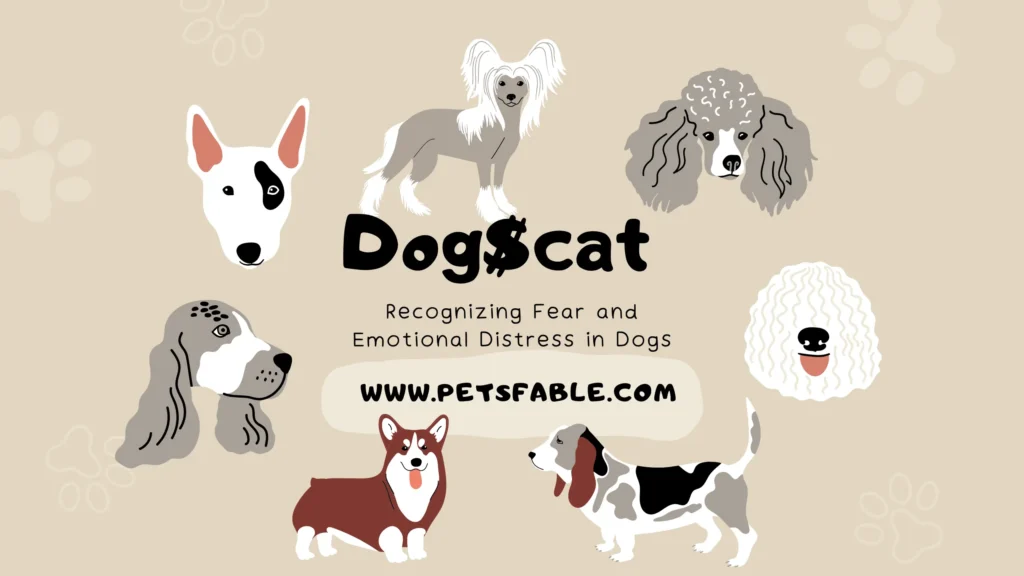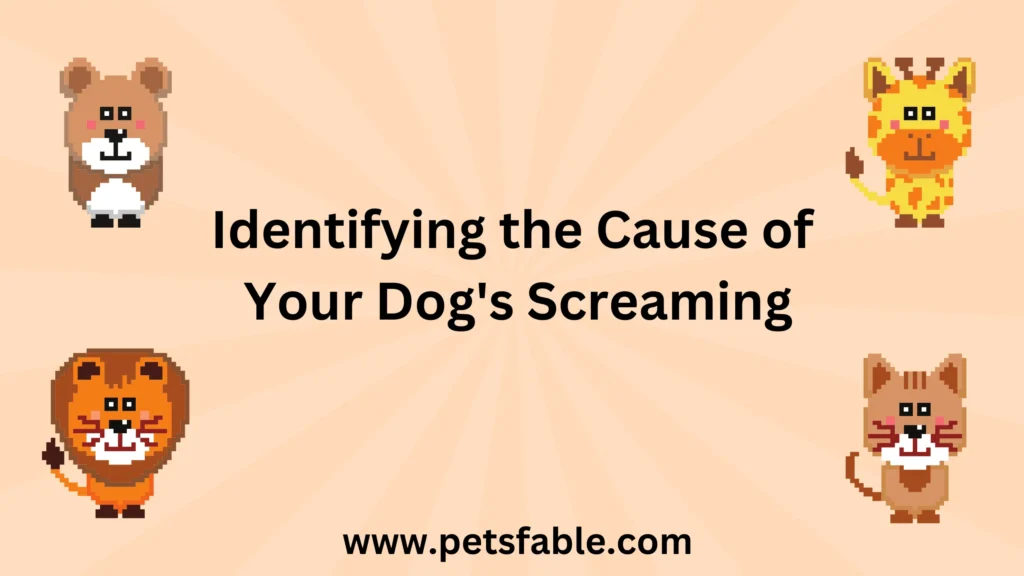Recognizing Distress Signals in Dogs Scream
When your Dogs Scream suddenly starts screaming, it's a significant indicator that something is amiss. This alarming behavior can be their way of expressing discomfort or distress.
Like humans, Dogs Scream can experience various types of discomfort that might lead to vocalizations. Observing when and where these episodes occur can help you identify the trigger.If the behavior persists, consulting a veterinarian is crucial to address the underlying issues and restore your pet’s well-being.
Top 5 Reasons Your Dog Might Be Screaming
- Physical Pain: Sudden screaming can be a clear sign of pain, whether from an injury, arthritis, or an internal issue.
- Anxiety or Stress: Dogs can express anxiety and stress vocally. Changes in the environment, separation from owners, or other stressors can provoke this response.
- Fear or Traumatic Flashbacks: Dogs, like humans, can have strong reactions to memories of past trauma.
- Communication: Sometimes, dogs scream to communicate their needs or frustrations, especially if other methods haven’t gained them the attention or result they need.
- Medical Conditions: Certain health issues like neurological disorders or complications from illnesses can lead to unusual vocal expressions such as screaming.
Steps to Take If Your Dog Screams
- Observe the Context: Note the time, setting, and what was happening around your dog when the screaming occurred.
- Comfort Your Pet: Provide immediate comfort and reassurance to help ease their anxiety or pain.
- Consult a Veterinarian: If you cannot determine a clear cause or if the screaming continues, seek professional advice to rule out medical conditions and receive appropriate treatment.
By understanding these distress signals and responding appropriately, you can help alleviate your dog’s discomfort and ensure they return to their normal, happy self.

Introduction to Canine Vocalizations
When your normally calm dog begins screaming unexpectedly, it’s a clear signal that something is wrong. This behavior might indicate pain, anxiety, or even a response to past trauma.
Observing the circumstances surrounding these episodes is crucial in identifying the cause. If this behavior persists, consulting a veterinarian is necessary to ensure your dog’s health and happiness.
Five Critical Reasons Your Dog May Be Screaming
- Sudden Pain or Injury:
If your dog starts screaming suddenly, they may be experiencing acute pain due to an injury or a health condition like kidney failure or other underlying issues, which a thorough veterinary examination can identify. - Anxiety or Stress:
Dogs can become overwhelmed by changes in their environment or stressful situations, leading to vocalizations such as screaming. - Past Trauma:
Similar to humans, dogs can have flashbacks to traumatic events, which may manifest in sudden, unexplained screaming. - Communication of Needs:
Your dog’s screams could be an attempt to communicate specific needs or discomforts that aren’t being met or understood. - Medical Conditions:
Various medical issues, including muscle cramps, joint pain, or ear infections, can cause significant discomfort, leading your dog to scream.
Read more: Critical Reasons Your Dog May Be ScreamingPractical Steps for Dog Owners
- Observe and Document:
Take note of when and where your dog exhibits these behaviors to help your vet make a more accurate diagnosis. - Provide Comfort:
Offer reassurance and comfort to help ease your dog’s anxiety or pain while you determine the next steps. - Seek Veterinary Care:
If your dog’s screaming is recurrent or accompanied by other signs of distress, such as changes in mobility, appetite, or elimination habits, it’s essential to seek professional advice immediately. - Maintain a Calm Environment:
Ensuring your dog has a stress-free environment and ample rest can help prevent episodes of distress. - Monitor for Other Symptoms:
Be vigilant for other signs that might indicate pain or discomfort, such as lethargy, panting, nasal discharge, or changes in posture.
Importance of Timely Intervention
Understanding and responding promptly to your dog’s screams are vital in maintaining their well-being. Regular veterinary check-ups and keen observation of your dog’s behavior can prevent further complications and ensure they lead a happy, healthy life.
This experience highlights the critical role of pet owners in recognizing and addressing their pets’ health needs proactively.
Why is My Dog Screaming? Understanding the Signs of Distress
Recognizing Fear and Emotional Distress in Dogs Scream
Dogs, like humans, experience a wide range of emotions and can express these through vocalizations such as screaming. This behavior isn’t always indicative of physical pain; it could also signal fear or anxiety.

Common triggers include loud noises, unfamiliar people, or even inanimate objects like a new piece of furniture. It’s important for owners to observe and understand what may be causing their dog’s fear and manage the environment accordingly.
Addressing Your Dog’s Fear
Managing a dog’s fear involves carefully observing their reactions and gently exposing them to the source of their fear, if safe.
Also read: How-to-properly-measure-dog-food
Should the fear persist or if the dog becomes extremely distressed, seeking advice from a veterinarian is recommended to rule out any underlying issues and to discuss potential treatments or behavior modification strategies.
Dogs and Dreams
Dogs, much like humans, dream and can react physically to their dreams, which might include screaming or moving in their sleep. If a dog frequently wakes up screaming, it could indicate a deeper issue, prompting a consultation with a vet.
Understanding Canine Fear Reactions
Dogs might react with a scream or yelp during seemingly routine activities if they are startled or scared, such as during walks when faced with sudden noises or unfamiliar sights.
Recognizing these reactions as fear-based allows owners to better support their dogs through reassurance and gradual desensitization to fearful stimuli.
Identifying Serious Health Issues
- Canine Cognitive Dysfunction (CCD): Similar to dementia in humans, CCD can cause disorientation and distress in dogs, manifesting as random screams.
- Syringomyelia: Particularly in certain breeds, this painful condition involves fluid-filled sacs in the spinal cord and can cause sharp pain, leading to screams.
- Anxiety: Many dogs experience anxiety, which can lead to vocalizations like screaming when they feel stressed or anxious, particularly in anticipation of being left alone.
- Boredom or Attention-Seeking: Dogs might also scream to express boredom or to seek attention from their owners, indicating a need for more interactive playtime or mental stimulation.
- Physical Discomfort When Being Picked Up: If a dog screams when picked up, it could be due to discomfort or pain from handling, especially if they have hidden injuries or dislike being lifted.
Proactive Measures for Dog Owners
- Observation: Carefully note when and why your dog screams to better address their needs.
- Environmental Management: Modify your dog’s environment to remove or gradually introduce them to fear-inducing elements.
- Veterinary Consultation: For persistent issues or if your dog’s screaming is accompanied by other signs of distress, consult a veterinarian to explore medical reasons and treatment options.
- Behavioral Training: Implement training techniques to help your dog feel more secure and to manage their responses to fear or anxiety effectively.
Read more: Proactive Measures for Dog OwnersIdentifying the Cause of Your Dog’s Screaming
- Medical Evaluation: First, ensure there are no underlying medical issues causing your dog’s screams. Symptoms like pain or cognitive decline should prompt an immediate vet consultation. If visiting a vet in person isn’t possible right away, consider an online consultation to get preliminary advice.
- Behavioral Consultation: If medical issues are ruled out, the next step is to consult a behaviorist or professional trainer. They can provide insights into any anxiety, fear, or excitement that might be triggering your dog’s screams.
- Seizure Management: If your dog experiences a seizure, ensure their safety by moving them to a soft area away from hazards. Stay calm and avoid putting your hands near their mouth. If seizures are prolonged or frequent, seek veterinary assistance immediately.
- Insect Bite Checks: Regularly check your dog for signs of insect bites, especially in areas like the paws or ears, which can cause significant discomfort and lead to screaming.
- Care for Dogs with Syringomyelia (SM): For dogs suffering from SM, use a harness instead of a collar to avoid neck pressure, and consider elevating their food and water bowls to make eating and drinking more comfortable.

Behavioral and Environmental Adjustments
- Calm Sleep Environments: To prevent nightmares and ensure peaceful sleep, keep your dog engaged and happy during the day. Regular physical and mental activities can help reduce stress that might affect their sleep.
- Insect Bite Treatment: If your dog has been bitten by an insect, carefully remove any stingers and apply ice to reduce swelling. Always consult a vet if you’re unsure how to treat the bite.
- Monitoring Screaming Patterns: Take note of when and under what circumstances your dog screams. This information can be invaluable for your vet or a behaviorist in diagnosing the cause.
- Avoiding Improper Medication: Never administer painkillers or any medication without veterinary guidance, as this could worsen your dog’s condition.
- Managing Overexcitement: Increase walk times to help your dog expend energy, which can reduce overexcitement. Reward calm behavior and provide mental stimulation through activities like puzzle games.
- Handling Separation Anxiety: To ease separation anxiety, leave an item with your scent and offer a challenging toy to keep your dog occupied when you’re not home.
Summary
Understanding and managing your Dogs Scream involves a combination of medical insight, behavioral understanding, and attentive care.By identifying the root cause and applying targeted strategies, you can help alleviate your dog’s distress and improve their overall well-being. Always collaborate with professionals like veterinarians and behaviorists to ensure you’re providing the best care for your canine companion.
FAQ’s:
Why did my Dogs Scream out of nowhere?
If your dog suddenly screams, it could be due to several reasons such as discomfort from pain, fear, anxiety, territorial reactions, cognitive issues, or even a neurological disorder. Identifying the cause is essential to properly address your dog’s distress and improve their well-being.
Why do dogs yelp for no reason?
Dogs may yelp seemingly without reason due to physical discomfort from injuries or conditions like arthritis, or as a behavioral response to stimuli causing fear, anxiety, or stress.
Why did my Dogs Scream in the middle of the night?
Dogs may howl or cry at night to communicate with other dogs or signal their presence. Additionally, night-time vocalizations could be alerts to perceived threats or disturbances in their environment.
Why is my dog squealing or crying?
Dogs often whine or squeal to seek attention, express excitement, anxiety, or as an appeasement gesture when trying to convey submission or friendliness.
What are the signs of seizures in dogs?
Signs of a seizure in dogs include unsteadiness, difficulty walking, involuntary movements such as chomping, or appearing to bite the air.
They may also collapse, stiffen, foam at the mouth, drool excessively, appear confused, fall suddenly, lose consciousness, or lose control of bodily functions like urination or defecation. Recognizing these signs can be crucial for providing timely and effective care.
Conclusion
Understanding the reasons behind a dog’s scream is crucial for providing them with a safe and comfortable environment.
Whether the cause is emotional distress, a bad dream, or a health issue, timely intervention and appropriate care can help ensure your dog’s well-being and strengthen the bond between you and your pet.
dogs scream to communicate their needs or frustrations, especially if other methods haven’t gained them the attention or result they need.
